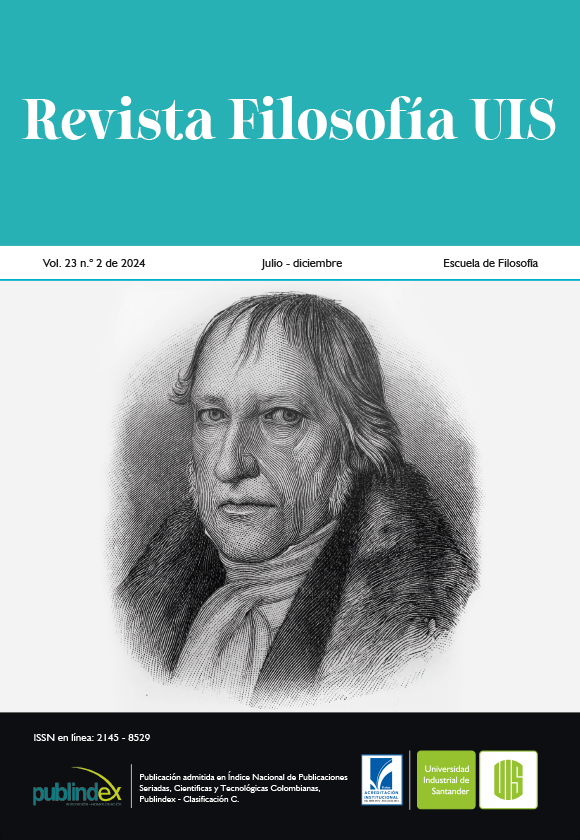Publicado 23-07-2024
Palabras clave
- Taxonomia,
- tipos de razones,
- razonamiento teórico,
- razonamiento práctico,
- normativa jurídica
Cómo citar
Derechos de autor 2024 Revista Filosofía UIS

Esta obra está bajo una licencia internacional Creative Commons Atribución 4.0.
Resumen
Este artículo pretende brindar una descripción completa de los diferentes tipos de razones respecto al razonamiento teórico y práctico. Se distinguen los siguientes tipos de razones: (1) epistemológicas y prácticas; (2) basadas en la fuente y el contenido; (3) anulables y concluyentes; (4) objetivas y subjetivas; (5) motivadoras, explicativas y de justificación; (6) de primer y de segundo orden; (7) de inclusión y de exclusión; e (8) intrínsecas e instrumentales. Estas distinciones son aplicadas al problema de la explicación de la normativa jurídica.
Descargas
Citas
- Adams, R. (1987). The Virtue of Faith and others Essays in Philosophical Theology. Oxford University Press.
- Alvarez, M. (2017). Reasons for Action: Justification, Motivation and Explanation. En E. Zalta (ed.). Stanford Encyclopedia of Philosophy. https://plato.stanford.edu/cgi-bin/encyclopedia/archinfo.cgi?entry=reasons-just-vs-expl
- Bratman, M. (1987). Intention, Plans and Practical Reason. Harvard University Press.
- Brunero, J. (2022). Practical Reasonns, Theoretical Reasons, and Permissive and Prohibitive Balancing. Synthese, 200(22), 1-23. https://doi.org/10.1007/s11229-022-03628-8
- Bonjour, L. y Sosa, E. (2003). Epistemic Justification: Internalism vs. Externalism, Foundations vs. Virtues. Wiley-Blackwell.
- Cambridge English Dictionary (2024). Dictionary. Cambridge University Press & Assessment. https://dictionary.cambridge.org/us/dictionary/english/guide
- Campbell, R. (2019). Moral Epistemology. En E. Zalta (ed.). Stanford Encyclopedia of Philosophy. Stanford University. https://plato.stanford.edu/cgi-bin/encyclopedia/archinfo.cgi?entry=moral-epistemology
- Comesaña, M. (1992). Putnam: los cerebros en la cubeta y el realismo interno. Páginas de Filosofía, 2(1), 18-23. https://revele.uncoma.edu.ar/index.php/filosofia/article/view/571
- Copi, I., Cohen, C., y Rodych, V. (2019). Introduction to logic. Taylor & Francis.
- Copp, D. y Morton, J. (2022). Normativity in Metaethics. En E. Zalta (ed.). Standford Encyclopedia of Philosophy. https://plato.stanford.edu/cgi-bin/encyclopedia/archinfo.cgi?entry=normativity-metaethics
- Crisp, R. (2018). Prudential and Moral Reasons. En D. Star (ed.). The Oxford Handbook Of Reasons And Normativity. Oxford University Press.
- Dancy, J. (2000). Practical Reality. Clarendon Press.
- Dworkin, R. (1986). Law’s Empire. Harvard University Press.
- Edmundson, W. (1998). Legitimate Authority without Political Obligation, Law and Philosophy, 17(1), 43-60.
- Finnis, J. (1996). The Truth in legal Positivism. En P. George (ed.). The Autonomy of Law. Clarendon Press.
- Finnis, J. (2020). Natural Law Theories. En E. Zalta (ed.). Stanford Encyclopedia of Law. https://plato.stanford.edu/entries/natural-law-theories/#LexIniNonEstLexDoSerUnjLawBinLeg
- Frankena, W. (1966). The concept of Morality, Journal of philosophy, 63(21). 688-696.
- Harman, G. (2004). Practical Aspects of Theoretical Reasoning. En A. Mele y P. Rawling (eds.). The Oxford Handbook of Rationality. University Press.
- Harman, R. (1986). Change in View. MIT Press.
- Hart, H.L.A. (1958). Legal and Moral Obligations. En A.I. Melden (ed.). Essays on Moral Philosophy. University of Washington Press.
- Hart, H.L.A. (1982). Commands and Autoritative Legal Reasons. En H.L.A Hart. Essays in Bentham. Clarendon Press.
- Hart, H.L.A. (1998). El concepto de derecho (G. Carrió, trad.). Abeledo Perrot.
- Hume, D. (1984). Tratado de la Naturaleza Humana III (F. Duque, trad.). Ediciones Orbis.
- Kaplan, D. (1989). Demonstratives. En J. Almog, J. Perry, y H. Wettstein (eds.). Themes From Kaplan. Oxford University Press, pp. 481-563.
- McNaughton, D. y Rawling, P. (2018). Motivating Reasons and Normative Reasons. En D. Star (ed.). The Oxford Handbook Of Reasons And Normativity. Oxford University Press.
- Merriam-Webster (2024). Dictionary. Merriam-Webster Inc. https://www.merriam webster.com/
- Oxford English Dictionary (2024). Dictionary. Oxford University Press. https://www.oed.com/dictionary/guide_n?tab=factsheet#2304997
- Raz, J. (1986). The Morality of Freedom. Clarendon Press.
- Raz, J. (2009). Can There Be a Theory of Law? En J. Raz. Between Authority and Interpretation. Oxford University Press.
- Ryan, R., y Deci, E. (2000). Intrinsic and Extrinsic Motivations: Classic Definitions and New Directions, Contemporary Educational Psychology, 25(1) 55-67.
- Shapiro, S. (2014). Legalidad (D. Papayannis y L. Lorena, trads.). Marcial Pons.
- Swinburne, R. (2001). Epistemic Justification. Clarendon Press.
- Trigos, L. (2009). Revisión de los conceptos contexto y circunstancia en la teoría de referencia directa para indexicales de D. Kaplan, Discusiones filosóficas, 10(15), 13-22. https://revistasojs.ucaldas.edu.co/index.php/discusionesfilosoficas/article/view/659
- Wodak, D. (2017). Can Objectivists Account for Subjective Reasons?, Journal of Ethics and Social Philosophy, 12(3), 259-279.

